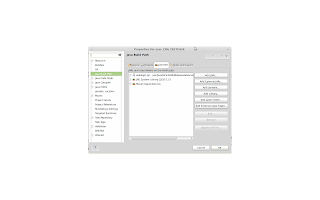java.lang.Error: Unresolved compilation problems:
Facing issue is often hurdle for developer :) :) As you all know, Java Developers Guide always posted the realtime issues. This issue I have faced while writing Junit test cases, but its not so easy to fix your development desktop. The below issue normally happens when the class path is missed the related weblogic jar.
I am using weblogic for jaxrpc client calls, and its failing to find the weblogic jar. Below error logs :
java.lang.Error: Unresolved compilation problems:
The type weblogic.wsee.jaxrpc.ServiceImpl cannot be resolved. It is indirectly referenced from required .class files
The type weblogic.wsee.jaxrpc.StubImpl cannot be resolved. It is indirectly referenced from required .class files
The import weblogic.wsee.security cannot be resolved
The import weblogic.xml cannot be resolved
The import weblogic.xml cannot be resolved
The method addCredentialsToSecurityHeader(Stub, HandlerInfo) in the type JdcNotificationHandler is not applicable for the arguments (JdcEnablerService_PortType_Stub, HandlerInfo)
The method addCredentialsToSecurityHeader(Stub, HandlerInfo) in the type JdcNotificationHandler is not applicable for the arguments (JdcEnablerService_PortType_Stub, HandlerInfo)
The method addCredentialsToSecurityHeader(Stub, HandlerInfo) in the type JdcNotificationHandler is not applicable for the arguments (JdcEnablerService_PortType_Stub, HandlerInfo)
CredentialProvider cannot be resolved to a type
CredentialProvider cannot be resolved to a type
CredentialProvider cannot be resolved to a type
ClientUNTCredentialProvider cannot be resolved to a type
WSSecurityContext cannot be resolved to a variable
at au.com.mycompany.mcas.sdp.bizservice.user.domain.util.notification.JdcNotificationHandler.<init>(JdcNotificationHandler.java:1)
at au.com.mycompany.mcas.sdp.bizservice.user.application.facade.spring.handler.JdcNotificationHandlerTest.<init>(JdcNotificationHandlerTest.java:31)
at sun.reflect.NativeConstructorAccessorImpl.newInstance0(Native Method)
at sun.reflect.NativeConstructorAccessorImpl.newInstance(NativeConstructorAccessorImpl.java:62)
at sun.reflect.DelegatingConstructorAccessorImpl.newInstance(DelegatingConstructorAccessorImpl.java:45)
at java.lang.reflect.Constructor.newInstance(Constructor.java:423)
at org.junit.internal.runners.JUnit4ClassRunner.createTest(JUnit4ClassRunner.java:72)
at org.mockito.internal.runners.JUnit44RunnerImpl$1.createTest(JUnit44RunnerImpl.java:26)
at org.junit.internal.runners.JUnit4ClassRunner.invokeTestMethod(JUnit4ClassRunner.java:79)
at org.junit.internal.runners.JUnit4ClassRunner.runMethods(JUnit4ClassRunner.java:51)
at org.junit.internal.runners.JUnit4ClassRunner$1.run(JUnit4ClassRunner.java:44)
at org.junit.internal.runners.ClassRoadie.runUnprotected(ClassRoadie.java:27)
at org.junit.internal.runners.ClassRoadie.runProtected(ClassRoadie.java:37)
at org.junit.internal.runners.JUnit4ClassRunner.run(JUnit4ClassRunner.java:42)
at org.mockito.internal.runners.JUnit44RunnerImpl.run(JUnit44RunnerImpl.java:37)
at org.mockito.runners.MockitoJUnitRunner.run(MockitoJUnitRunner.java:62)
at org.eclipse.jdt.internal.junit4.runner.JUnit4TestReference.run(JUnit4TestReference.java:50)
at org.eclipse.jdt.internal.junit.runner.TestExecution.run(TestExecution.java:38)
at org.eclipse.jdt.internal.junit.runner.RemoteTestRunner.runTests(RemoteTestRunner.java:467)
at org.eclipse.jdt.internal.junit.runner.RemoteTestRunner.runTests(RemoteTestRunner.java:683)
at org.eclipse.jdt.internal.junit.runner.RemoteTestRunner.run(RemoteTestRunner.java:390)
at org.eclipse.jdt.internal.junit.runner.RemoteTestRunner.main(RemoteTestRunner.java:197)
How to fix :- This is very simple, just add the weblogic.jar library jar into your class path. Steps as below,
Right Click on Project => Build Path => Libraries and then add the required jar (In my case I have added weblogic.jar).
The screenshot attached for reference.
Hope it will help you.
- Severe Catalina Starting Issue
- Java OutOfMemory Error
- Failed to execute goal org.apache.maven.plugins
- How to fix hibernate LazyInitializationException
- Why mocking is null after @InjectMocks
- How to mock private fields of a class for JUnit testing
- Weblogic not starting.

